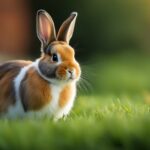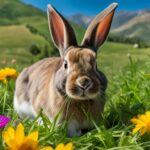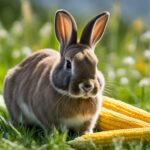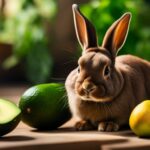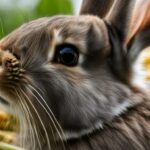Are you considering a full grown Netherland Dwarf rabbit as a pet? These adorable creatures are one of the smallest rabbit breeds, originating in Holland. With their compact bodies, short ears, and large eyes, they capture the hearts of rabbit enthusiasts everywhere. Not only are they recognized by the American Rabbit Breeders Association (ARBA), but they also come in a variety of colors to suit any preference. If you’re looking for a social and friendly companion, the Netherland Dwarf could be the perfect pet for you.
Key Takeaways:
- The Netherland Dwarf is one of the smallest rabbit breeds, originating in Holland.
- They are recognized by the American Rabbit Breeders Association (ARBA) and come in various colors.
- Netherland Dwarfs are social and friendly animals, making them great pets.
- They have a compact body, short ears, and large eyes.
- Proper socialization, training, and mental stimulation are important for their well-being.
History and Breed Origin
The Netherland Dwarf rabbit breed has a fascinating history originating in Holland. Breeders in Holland dedicated years of work to develop a small rabbit with a standardized appearance. The breed carries the dwarf gene, which was initially discovered in the mid-1900s. This gene is responsible for the Netherland Dwarf’s petite size and distinctive characteristics. The American Rabbit Breeders Association (ARBA) recognized the Netherland Dwarf in 1969, acknowledging its significance as one of the most beloved rabbit breeds in the United States.
The history of the Netherland Dwarf showcases the dedication and passion of breeders in Holland who aimed to create a unique and miniature rabbit. Through careful selection and breeding, they successfully established a breed that captured the hearts of rabbit enthusiasts worldwide. The recognition from ARBA solidified the Netherland Dwarf’s place in the rabbit community, further popularizing this charming breed.
The breed’s heritage ties closely to its native country, Holland, where its journey began. Today, the Netherland Dwarf is not only cherished for its historic significance but also for its small size and adorable appearance. As we explore further, we will discover more about the intriguing characteristics and delightful temperament that make the Netherland Dwarf a sought-after pet.
Table: Netherland Dwarf Rabbit Breed Origin
| Year | Event |
|---|---|
| Mid-1900s | Discovery of the dwarf gene |
| 1969 | Recognition by the American Rabbit Breeders Association (ARBA) |

“The Netherland Dwarf breed carries a rich history rooted in Holland, where its journey as a small and unique rabbit began. The dedication of breeders in developing a standardized appearance and the recognition from ARBA solidify its importance in the rabbit world today.”
Characteristics and Appearance
The Netherland Dwarf rabbit is known for its unique characteristics and adorable appearance. As one of the smallest rabbit breeds, they have a compact body, short ears, and large eyes that capture the hearts of rabbit enthusiasts. With a weight ranging from 2 to 2.5 pounds, these petite rabbits are a delight to behold.
The Netherland Dwarf’s compact body makes them easily distinguishable from other breeds. Their short ears give them an endearing charm, while their large eyes are incredibly expressive. Their small size, combined with these distinct features, makes them incredibly appealing as pets.
One of the exciting aspects of Netherland Dwarfs is the wide variety of colors they come in. Whether you prefer a classic black, a striking blue, a rich chocolate, or a vibrant orange, there are Netherland Dwarfs to suit every taste. The diversity of colors adds to the visual appeal of these adorable rabbits, making them even more captivating.
Overall, the Netherland Dwarf rabbit’s characteristics and appearance make them a popular choice among rabbit lovers. Their small size, compact body, short ears, large eyes, and range of colors combine to create a unique and delightful pet.
“The Netherland Dwarf rabbit’s compact body, short ears, and large eyes make them a charming and irresistible breed.” – Rabbit Enthusiast
| Characteristic | Description |
|---|---|
| Size | 2-2.5 pounds |
| Body | Compact |
| Ears | Short |
| Eyes | Large |
| Colors | Black, blue, chocolate, orange, and more |
Temperament and Behavior
When it comes to the temperament of Netherland Dwarf rabbits, they are known for being social and energetic. Although they may be initially shy, with proper socialization and training, they can become affectionate and loving companions. These rabbits enjoy interacting with their owners and thrive on human companionship.
Due to their high energy levels, Netherland Dwarfs require ample mental and physical stimulation. Providing them with toys and opportunities for play can help keep them entertained and prevent boredom. Their small size makes them agile, and they love hopping around the house, so creating a safe environment for them to explore is essential.
Netherland Dwarfs are intelligent and can be trained to use a litter tray, making them suitable for indoor living. However, it’s important to note that they may not be the best choice for homes with very young children, as their small size and delicate nature require gentle handling. Supervision is necessary to ensure the safety of these little bunnies.

Overall, Netherland Dwarf rabbits are known for their friendly and energetic personalities. With proper care, socialization, and plenty of love, they can make wonderful companions for individuals and families alike.
Lifespan and Health Issues
When considering a Netherland Dwarf rabbit as a pet, it’s important to understand their lifespan and potential health issues. These adorable bunnies have an average lifespan of 10 to 12 years, making them long-term companions for those willing to provide the necessary care and attention.
Like all rabbits, Netherland Dwarfs are prone to certain health issues. One common problem is dental issues. Their small size and compact skull can lead to dental malocclusion, where the teeth don’t align correctly. This can cause pain, difficulty eating, and other complications. Regular dental check-ups and a healthy diet that includes plenty of hay can help prevent and manage dental issues.
Another health concern is gastrointestinal stasis, also known as a “GI stasis.” This condition occurs when the rabbit’s digestive system slows down or stops, leading to a loss of appetite, bloating, and discomfort. Providing a high-fiber diet, regular exercise, and monitoring their overall well-being can help prevent GI stasis.
“Regular dental check-ups and a healthy diet that includes plenty of hay can help prevent and manage dental issues.”
Ear mites are another common issue that can affect Netherland Dwarfs. These tiny parasites can cause itching, redness, and discomfort in the ears. Regular cleaning and inspection of the ears, along with appropriate treatment from a veterinarian if necessary, can help keep ear mites at bay.
Lastly, female Netherland Dwarfs are prone to uterine cancer. Spaying them at a young age can greatly reduce the risk of developing this life-threatening condition. Consulting with a veterinarian about the best time for spaying is crucial to ensure the long-term health of your rabbit.
| Health Issue | Prevention | Treatment |
|---|---|---|
| Dental problems | Regular dental check-ups, hay-rich diet | Professional dental care, tooth trimming |
| Gastrointestinal stasis | High-fiber diet, regular exercise | Veterinary treatment, pain management |
| Ear mites | Regular ear cleaning and inspection | Veterinary-prescribed ear drops or medication |
| Uterine cancer (female rabbits) | Spaying at a young age | Veterinary spaying procedure |
Daily Care and Housing
Proper daily care and housing are crucial for the health and well-being of your Netherland Dwarf rabbit. Here are some essential tips to ensure they thrive in their living environment.
Food and Diet
Netherland Dwarfs have specific nutritional needs to maintain their health. A balanced diet should consist of high-quality hay, fresh vegetables, and pellets formulated for rabbits. Hay should make up the majority of their diet, providing essential fiber for proper digestion. Fresh vegetables such as leafy greens and carrots should be offered in moderation as a supplement to their hay. It’s important to avoid foods that can be harmful to rabbits, such as chocolate, caffeine, and sugary treats. Fresh, clean water should be available at all times in a sipper bottle or a shallow bowl.
Exercise
Regular exercise is vital for Netherland Dwarfs to prevent obesity and promote physical and mental stimulation. These energetic rabbits need at least three hours of free-range time daily to hop, explore, and play. A spacious, safe area that is escape-proof and free from hazards should be provided. You can also create an outdoor enclosure or use a rabbit-proofed room for supervised outdoor playtime. Providing toys, tunnels, and obstacle courses will keep them entertained and help satisfy their natural instincts.
Living Requirements
Netherland Dwarfs should have an appropriate living environment that meets their needs. A cage or hutch should be spacious enough for them to move comfortably. The minimum recommended size for a single rabbit is 4 square feet, but more space is always better. The living area should have a solid floor to prevent injuries to their delicate feet. A cozy sleeping area, such as a hideout or a small box with bedding, should be provided for their comfort. Regular cleaning is essential to maintain a hygienic living environment. It’s also important to monitor the temperature and humidity levels to ensure they are within a comfortable range for your rabbit.
By following these guidelines for daily care and housing, you can provide a loving and nurturing environment for your Netherland Dwarf rabbit, ensuring they lead a happy and healthy life.

Recommended Rabbit Food
When it comes to feeding your Netherland Dwarf rabbit, it’s important to provide them with a balanced diet that meets their nutritional needs. Hay is a crucial part of their diet and should account for at least 70% of their daily food intake. High-quality hay, such as timothy or orchard grass, helps maintain their dental health and provides essential fiber for their digestive system.
Alongside hay, it’s recommended to supplement your Netherland Dwarf’s diet with high-quality pellets. Sherwood Pet Health Adult Rabbit Food is an excellent choice for their pellet portion. This specially formulated rabbit food is made with natural ingredients to promote digestive health and urinary health. It contains essential vitamins and minerals to ensure your rabbit receives the necessary nutrients for their overall well-being.
It’s important to remember that rabbits have sensitive digestive systems, so it’s crucial to introduce new foods gradually and monitor your rabbit’s response. Always provide fresh vegetables as part of their diet, such as dark, leafy greens like kale or romaine lettuce. Avoid feeding them foods that are high in sugar or starch, as these can lead to digestive upset and other health issues.
| Food | Benefits |
|---|---|
| Hay | Provides essential fiber for digestion and helps maintain dental health |
| Sherwood Pet Health Adult Rabbit Food | Promotes digestive and urinary health with natural ingredients |
| Dark, leafy greens | Provides additional vitamins and minerals |
Remember to always provide clean, fresh water for your Netherland Dwarf rabbit. Water should be available at all times, and the water dispenser should be cleaned regularly to ensure hygiene. It’s also important to avoid overfeeding your rabbit, as obesity can lead to various health problems. Consult with your veterinarian for specific feeding guidelines and any additional dietary recommendations for your Netherland Dwarf rabbit.

Exercise and Enrichment
Netherland Dwarf rabbits are energetic creatures that require regular exercise and mental stimulation. Providing them with opportunities to stay active and engaged is crucial for their well-being. Here are some tips on how to keep your Netherland Dwarf rabbit entertained and healthy.
Free-range Time
Allowing your Netherland Dwarf rabbit to have at least three hours of free-range time is vital. Create a safe space where they can hop, play, and explore. Ensure that the area is secure and free from hazards. Supervise their activities to prevent any accidents or encounters with potential predators. If you don’t have a suitable indoor space, you can consider setting up an outdoor enclosure where they can safely enjoy fresh air and sunshine.
Toys and Enrichment
Providing your Netherland Dwarf rabbit with a variety of toys and enrichment activities is essential to prevent boredom. Rabbits are naturally curious animals, so choose toys that stimulate their senses and encourage physical activity. Puzzle toys, tunnels, and chew toys are great options to keep them engaged. You can also rotate their toys regularly to keep things interesting. Remember to use bunny-safe materials and avoid anything that could be harmful if ingested.
Mental Stimulation
In addition to physical exercise, mental stimulation is crucial for your Netherland Dwarf rabbit’s well-being. Engage them in activities that challenge their minds, such as treat puzzles or hiding their favorite snacks around the play area for them to find. This not only keeps them mentally stimulated but also taps into their natural foraging instincts. Creating a stimulating environment with different textures, hiding spots, and platforms can also provide mental stimulation as they explore and navigate their surroundings.
By incorporating regular exercise, providing engaging toys, and stimulating their minds, you can ensure that your Netherland Dwarf rabbit remains happy, healthy, and entertained.

Family Compatibility and Training
When considering a Netherland Dwarf rabbit as a pet, it’s important to assess its compatibility with your family and understand the training required to ensure a healthy and happy relationship. Netherland Dwarfs can be excellent pets for many households, including couples, singles, and seniors. However, due to their shy nature, they may not be suitable for homes with very young children who may not fully understand how to handle or interact with them.
To build a strong bond with your Netherland Dwarf, proper training and socialization are key. Start by giving your rabbit plenty of space to explore and gradually introduce new experiences, people, and environments. This will help them feel more comfortable and confident. Be patient and gentle, allowing them to approach you on their own terms. Positive reinforcement, such as treats, praise, and gentle strokes, can be used to reward good behavior and encourage trust.
Litter training is an essential aspect of owning a Netherland Dwarf rabbit. These intelligent animals can be successfully trained to use a litter tray, but it may require some patience. Place multiple litter trays throughout the house, ensuring accessibility in different areas. Gradually introduce your rabbit to the trays and observe their preferences. Clean the trays regularly to maintain hygiene and prevent any accidents.

By providing a safe and nurturing environment, along with consistent training and socialization, you can ensure a strong bond with your Netherland Dwarf rabbit. Remember that each rabbit is unique, and it may take time for them to fully adjust to their new home. With patience, love, and proper care, your Netherland Dwarf rabbit will become a cherished member of your family.
Breeding and Genetics
When it comes to breeding Netherland Dwarf rabbits, understanding their genetics is essential. The breed carries the dwarf gene, which determines their small size. Breeding true dwarfs, which have two copies of the dwarf gene, is important to maintain the breed’s characteristics. However, it’s crucial to be aware of the potential risks involved.
True dwarfs can produce offspring with lethal genetic combinations, known as “peanuts.” These peanuts have a reduced chance of survival and often face health complications. Therefore, it’s recommended to breed only healthy rabbits with no genetic health issues to minimize the risk of producing peanuts.
In breeding programs, false dwarfs can be used to introduce genetic diversity. False dwarfs have one copy of the dwarf gene and one copy of the normal-sized gene. While they don’t meet the breed standard, they can still make excellent pets. Breeding false dwarfs with true dwarfs can result in a mix of true and false dwarfs.
Table: Netherland Dwarf Breeding and Genetics
| Breeding Type | Description |
|---|---|
| True Dwarfs | Rabbits with two copies of the dwarf gene; meet breed standard; risk of producing peanuts |
| False Dwarfs | Rabbits with one copy of the dwarf gene and one copy of the normal-sized gene; don’t meet breed standard; suitable as pets |
| Mixed Breeding | Mating true dwarfs with false dwarfs; results in a mix of true and false dwarfs |

“Breeding Netherland Dwarfs requires careful consideration of genetics to ensure the health and well-being of the offspring. It’s crucial to only breed healthy rabbits and avoid the risk of producing peanuts, which can have severe health complications. By understanding the different breeding types and the presence of the dwarf gene, breeders can make informed decisions and contribute to the continued success of the Netherland Dwarf rabbit breed.” – Rabbit Breeding Expert
Netherland Dwarf Rabbit Care Tips
When it comes to caring for a Netherland Dwarf rabbit, there are a few important tips to keep in mind. Providing the right nutrition, ensuring companionship, and maintaining a safe and stimulating environment are key to keeping these adorable bunnies happy and healthy.
Nutrition
Netherland Dwarf rabbits require a balanced diet to thrive. Their diet should consist of high-quality hay, fresh vegetables, and a small amount of pellets. Hay should make up the majority of their diet, as it promotes good digestion and helps wear down their teeth. Fresh vegetables provide essential vitamins and minerals, but be sure to introduce new foods gradually to avoid digestive upset. Pellets should be limited to a small portion to prevent obesity. It’s crucial to provide fresh water at all times in a clean, accessible container.
Companionship
Netherland Dwarfs are social creatures and thrive on companionship, whether from humans or other rabbits. They enjoy being part of a family and should have daily interactions and playtime. Spending time with your Netherland Dwarf rabbit, petting and talking to them, helps build trust and strengthens the bond between you. If you’re away for long periods, consider having a companion rabbit or providing toys and puzzles to keep them mentally stimulated.
Living Environment
Creating a safe and stimulating living environment is vital for a Netherland Dwarf rabbit’s well-being. They should have a spacious and clean cage or enclosure with plenty of room to hop and exercise. Avoid wire-bottom cages to prevent foot injuries, and provide a cozy hiding spot for them to retreat to when they need privacy. Regularly clean their living space to maintain hygiene and prevent diseases. Additionally, ensure their environment is free from hazards such as toxic plants, electrical cords, and small objects that could be chewed and swallowed.
Remember, each rabbit is unique, so it’s essential to observe your Netherland Dwarf closely and tailor their care to suit their specific needs. By following these care tips, you can ensure that your Netherland Dwarf rabbit lives a happy and fulfilling life as part of your family.

Netherland Dwarf Rabbits as Pets
If you’re looking for a pet that combines cuteness, affection, and a small size, look no further than the Netherland Dwarf rabbit. These adorable bunnies make wonderful companions and are suitable for various households, including apartments. With their friendly personalities, they are sure to melt your heart.
One of the reasons Netherland Dwarfs make great pets is their affectionate nature. These bunnies enjoy spending time with their owners, often seeking cuddles and attention. Their small size makes them easy to handle and they can form strong bonds with their human companions. Whether you’re a first-time pet owner or an experienced bunny lover, the Netherland Dwarf is a delightful choice.

As pets, Netherland Dwarfs display all the charming characteristics commonly associated with rabbits. They are playful, curious, and full of energy. Their small size and friendly temperament make them a joy to have around the house. However, it’s important to provide ample exercise and mental stimulation to keep them happy and healthy. Daily playtime and the provision of toys are essential for their well-being.
Grooming and Care
When it comes to grooming, Netherland Dwarfs have relatively low maintenance needs. They have short to medium-length coats that require minimal brushing. However, during shedding season, regular brushing can help remove loose hair and prevent matting. It’s also important to trim their nails regularly and check their teeth for any signs of overgrowth or dental problems.
Overall, Netherland Dwarfs are delightful pets that bring joy and companionship to their owners. Their small size, affectionate nature, and adorable bunny appearance make them a popular choice for many households. With proper care, these little rabbits can live fulfilling lives and become cherished members of your family.
Conclusion
In conclusion, the Netherland Dwarf rabbit is a delightful pet that brings joy and companionship to many households. With their small size, friendly temperament, and unique appearance, they are a popular choice for both experienced rabbit enthusiasts and first-time owners.
Caring for a Netherland Dwarf rabbit involves providing a safe and comfortable living environment, ensuring they have a balanced diet, and regular vet check-ups. These small but mighty bunnies require daily exercise and mental stimulation to keep them happy and healthy.
Whether you live in an apartment or a house, the Netherland Dwarf rabbit is a perfect companion. They are affectionate, enjoy cuddling, and easily bond with their owners. Their manageable size and ease of care make them an ideal pet for individuals, couples, and seniors.
If you are considering adding a Netherland Dwarf rabbit to your family, take the time to research and find a reputable breeder or adoption center. These adorable bunnies will surely bring love and happiness to your home for many years to come.
FAQ
What is the average lifespan of a Netherland Dwarf rabbit?
The average lifespan of a Netherland Dwarf rabbit is between 10 to 12 years.
Is the Netherland Dwarf rabbit a social animal?
Yes, Netherland Dwarfs are social animals with friendly personalities.
What are the common health issues that Netherland Dwarf rabbits may face?
Netherland Dwarfs are prone to dental problems, gastrointestinal stasis, ear mites, and uterine cancer.
How should I feed a Netherland Dwarf rabbit?
Netherland Dwarfs require a balanced diet consisting of hay, pellets, and fresh vegetables. Clean water should also be available at all times.
How much exercise do Netherland Dwarf rabbits need?
Netherland Dwarfs should have at least three hours of free-range time or access to an outdoor enclosure for daily exercise.
Are Netherland Dwarf rabbits suitable for homes with young children?
Netherland Dwarfs may not be suitable for homes with very young children due to their shy nature.
What should I consider when breeding Netherland Dwarf rabbits?
Breeding Netherland Dwarfs requires knowledge and care due to the presence of the dwarf gene. Lethal genetic combinations known as “peanuts” can result from breeding true dwarfs.
How should I care for the coat of a Netherland Dwarf rabbit?
Regular grooming, including brushing during shedding season, helps maintain the coat’s health.
Are Netherland Dwarf rabbits good pets?
Yes, Netherland Dwarfs make wonderful pets due to their small size and friendly personalities.


